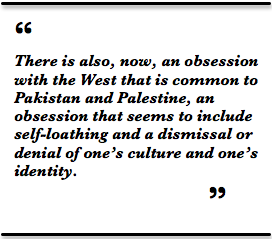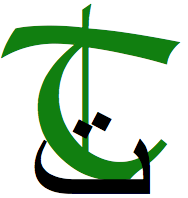English | اردو
Pakistan and Palestine have more in common than some in Pakistan care to recognize.
Whenever I visit the United States, I find that Americans often mix-up Palestine and Pakistan. Their stupidity and inability to differentiate between the two countries is characteristic of what Edward Said defined as Orientalism: “they” all look the same, they all sound the same, and their names sound the same. Yet, such mistakes can also be helpful, because there is indeed much in common between the two sites: one is a colony, and the other is a post-colony—both of a particular kind.
Both places are tied to imperialism. Pakistan was born out of British imperialism that created a state for the Muslims of India. Palestine became colonized under British  imperialism to create a “state for the Jewish people.” In the case of Pakistan, Muslims were already living in the area. For Palestine, Jews had to be imported from Europe as settlers to make the idea of a state for the Jewish people possible. In the first case—Pakistan— there was a reality, but this reality could have been dealt with in a different way. In the second case, the reality had to be invented from scratch. In both places, Britain, similar to other western imperial powers, claimed innocence, and the ills of their projects had to be paid for by the native population. Mass murder and mass forced migration between the new states of India and Pakistan, and mass expulsion and murder by the Jewish colonial settlers against the native Palestinians. Both born in violence and remain entangled in it.
imperialism to create a “state for the Jewish people.” In the case of Pakistan, Muslims were already living in the area. For Palestine, Jews had to be imported from Europe as settlers to make the idea of a state for the Jewish people possible. In the first case—Pakistan— there was a reality, but this reality could have been dealt with in a different way. In the second case, the reality had to be invented from scratch. In both places, Britain, similar to other western imperial powers, claimed innocence, and the ills of their projects had to be paid for by the native population. Mass murder and mass forced migration between the new states of India and Pakistan, and mass expulsion and murder by the Jewish colonial settlers against the native Palestinians. Both born in violence and remain entangled in it.
Palestine and Pakistan are also sites tied to the current imperial power, the United States. Pakistan became tied to American imperialism in the region soon after its inception and continues to this day. During the Cold War, it was linked to the American policy of containing progressive nationalist and socialist possibilities in the region. Today, it is a site of American interest in fighting “Islamic terrorism” that they—the U.S. together with the Pakistani state—helped create. Being tied to empire has not helped the country much, and especially, has not helped the common people who are the great majority in the country. Read on >>



[…] Pakistani left. Sunaina Maira discusses the Pakistan liberal antipathy to Palestine. Magid Shihade draws comparisons between his home, Palestine, and the conditions in Pakistan where he has spent time. […]